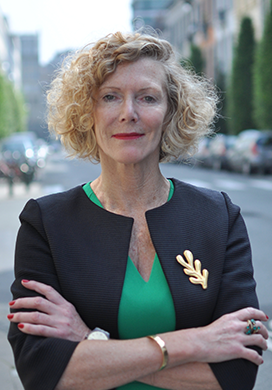With Brexit and Trump and CETA and China’s Market Economy Status, trade is making headlines as never before. Cambre Foreign Policy Director Leanda Barrington-Leach this morning hosted a panel of journalists to find out how the stories are playing and why. The key takeaway was that trade is increasingly political but pro-trade stakeholders have yet to adapt their way of communicating and are lagging far behind anti-globalisation activists.
Trade used to be managed by experts and explained by numbers. Now, a balanced and informed media debate about trade requires political faces and authoritative voices from the pro-trade camp, good messages and stories about the impact on people’s lives, and broader coalitions.
Politics Trumps trade
“There was hardly a trade story policy when I started here; now it’s front page material and will be for some time to come”, said Arthur Beesley from the Financial Times opening the debate. The politicisation of the trade agenda was a red thread throughout the debate, as the panellists acknowledged the need for impartial, specialised reporting while marrying it with the need to communicate this complicated topic to a widening audience.
Negative stories are driving this politicisation and popularisation. As Philip Blenkinsop from Reuters conceded, “inevitably a protest is more visually interesting than a signature of a document or a meeting of officials”. “It’s much more sexy to show images of protests than explaining the benefits of trade, concurred Gabriel Grésillon from the French business daily Les Echos.
Media, the panellists pointed out, are not however driving this trend so much as reflecting the breakdown of political consensus around liberalism and free trade, which is being undermined from the bottom up, as the grassroots campaign against TTIP and CETA and the stand of the Walloon parliament demonstrated. “Protectionism is especially strong at national level”, pointed out Grésillon.
The decline in trust
The case of trade is evidence of a broader reality re-shaping politics and international relations. Even before the barrage unleashed by US President Trump, expertise was getting a thrashing. “We have a major trust issue”, said Grésillon. This is true of politicians and institutions, but also independent sources such as the pollsters. “The polls were wrong for both Brexit and Trump on the eve of voting. Arguably the polls were the biggest fake news we had last year,” pointed out Blenkinsop. The media has to deal with this rise of “alternative facts” and “fake news”, while also falling under suspicion itself. “We are spending more and more time fact-checking,” said Grésillon, “but then there is still always the question of whose fact-checking is more legitimate.”
Building the case for trade
Media have a duty to get the story right, but they also need a story they can sell, and vague fearmongering is simply not enough. MLex’s Poppy Bullock made an apt comparison between the Commission’s narrative ahead of the Brexit referendum and a nuclear red button: “If you have a 5 year old and a red button and you tell them to under no circumstance press the red button for fear of unknown terrors, and then you leave them alone in the room… what do you think they will do? Press the red button of course!” People are drawn to the story of change and the anti-globalisation narrative needs to be countered by another, equally dynamic narrative.
“People are not stupid, they get the important issues,” said Beesley, recalling how the financial crises made Irish taxi drivers experts on credit default swaps and yields on 10 year bonds. Instead of seeking to dismiss critical or unwelcome voices, we can and should seek to understand them. For the media to be able to balance the debate further, other stakeholders – from businesses to politicians – need to engage more, earlier and better.
Podcast: Play in new window | Download
